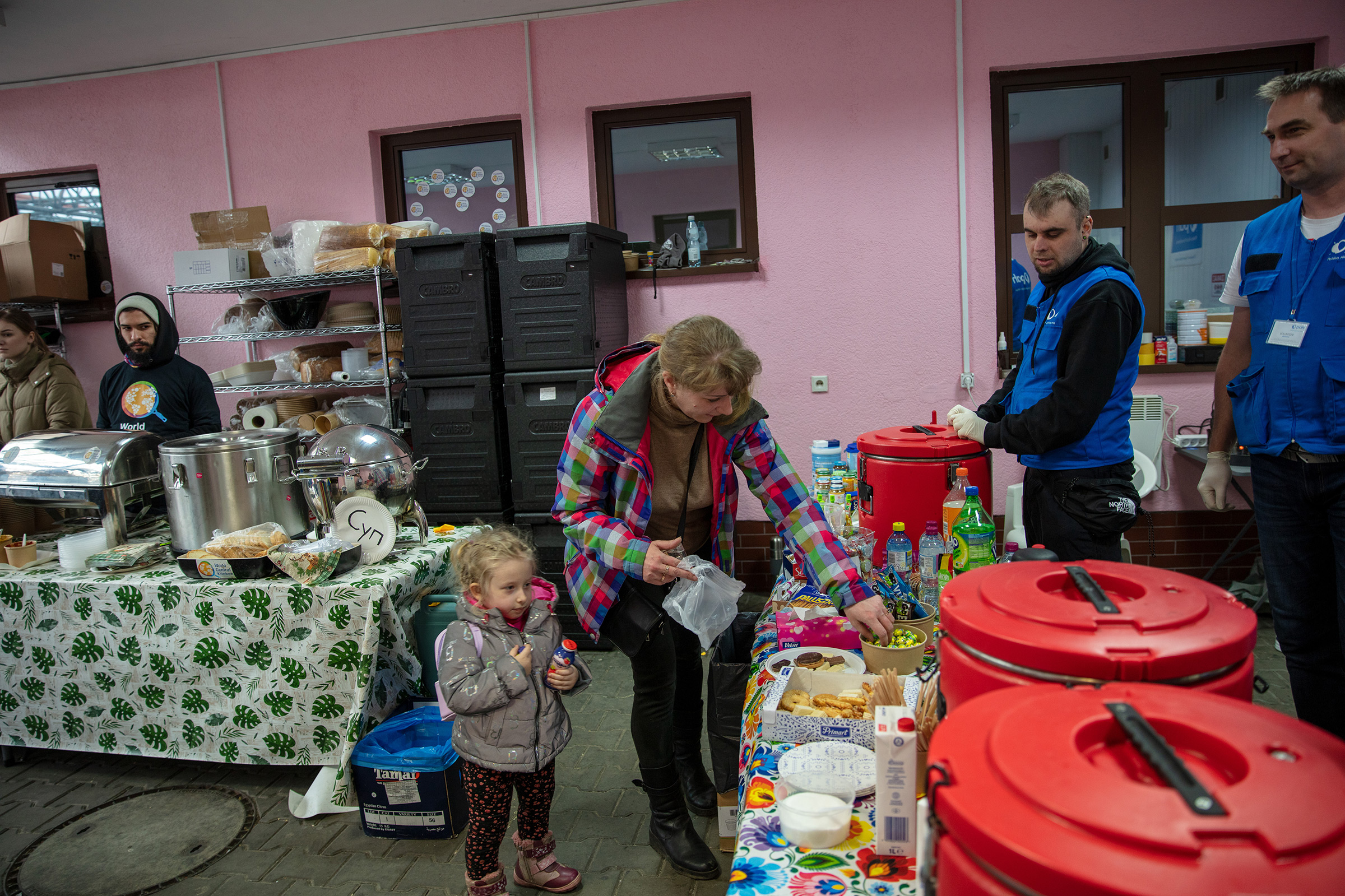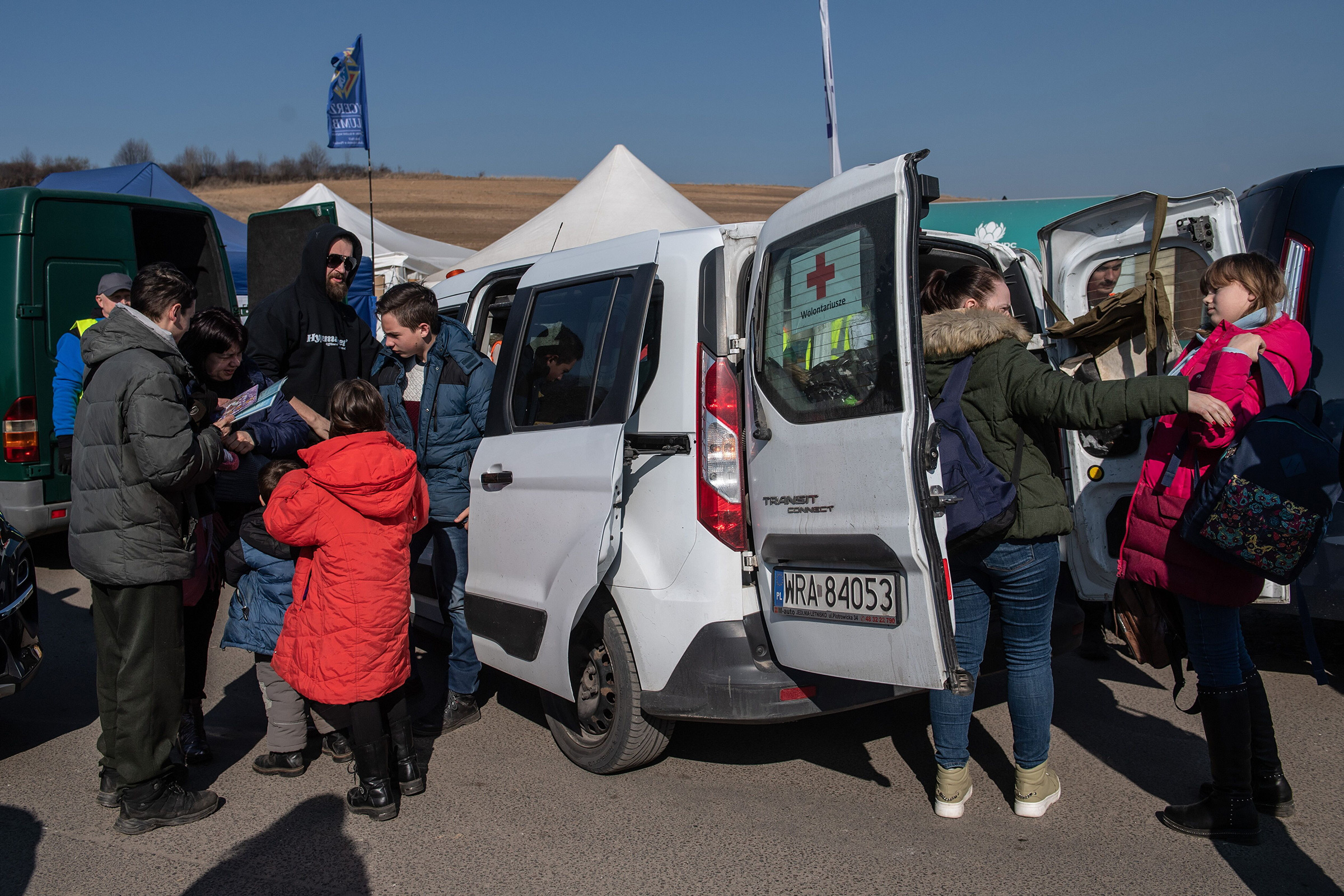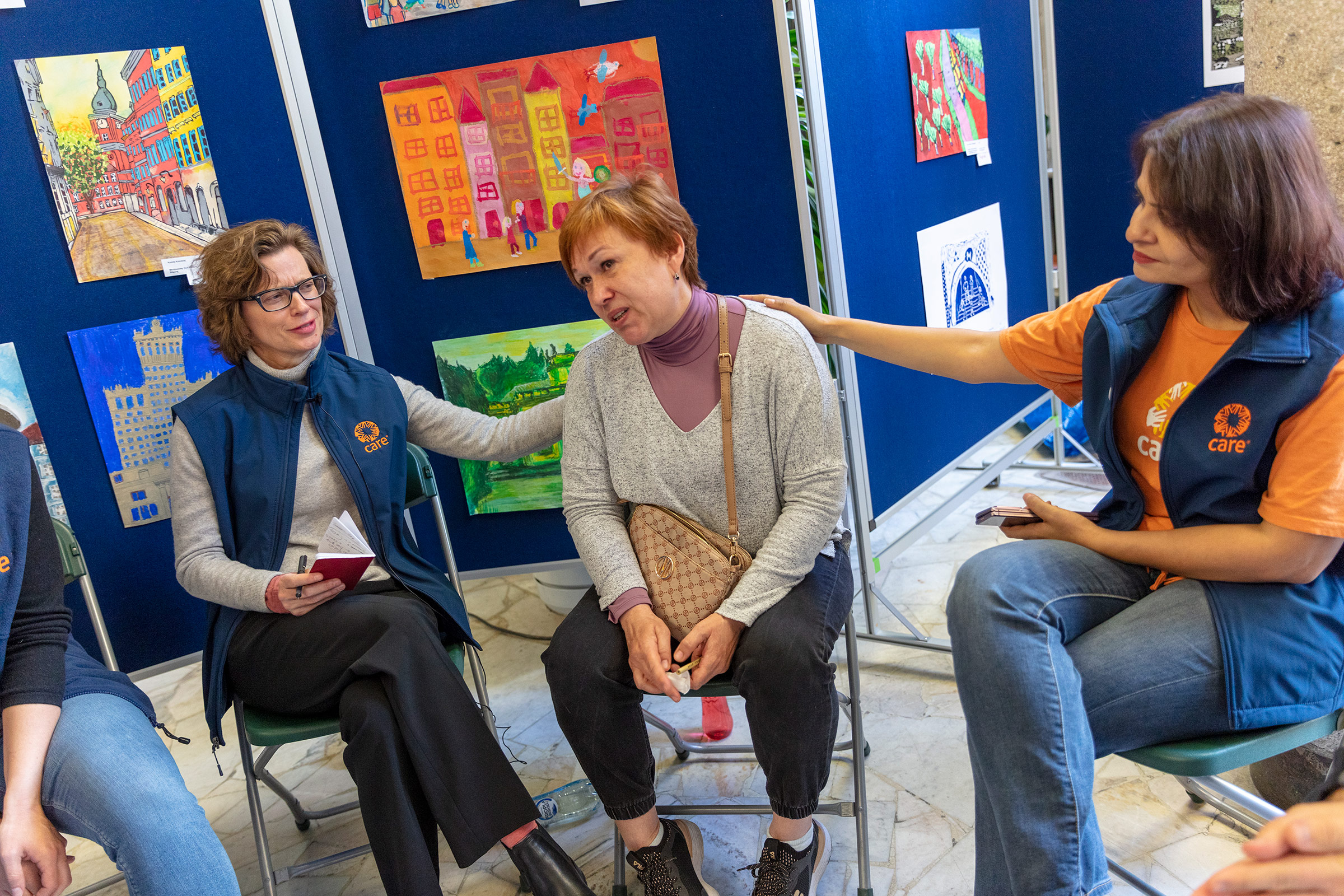
Stengel is the former Editor of TIME, an MSNBC analyst and the author of Information Wars: How We Lost the Global Battle Against Disinformation.
They walk off the bus slowly, tentatively. Young women holding the hands of small children. Grandmothers right behind carrying over-stuffed suitcases—or dragging garbage bags of clothes. All the mothers wear sneakers. There are a handful of old men, hunched over. Quite a few dogs, mostly small ones, none barking. The passengers barely lift up their eyes. Everyone looks beaten down, exhausted. A Polish volunteer greets them and is blowing bubbles for the children, but the kids don’t seem interested.
This is the main entry station on the Polish border, in Hrebenne, for Ukrainian refugees. It’s one of the largest of eight Polish entry points for the more than two million Ukrainians who have journeyed to this nation of 38 million people. Normally this place is a passport control area, but these days, Ukrainians don’t need passports to enter, just any kind of identification that they are Ukrainian. A driver’s license. A phone bill. There are cardboard boxes of used clothes—and toys. There’s a room with coffee, cheese sandwiches, and a giant tin of fresh pierogis. They will be processed by a dozen or so mostly Polish volunteers, who are unfailingly patient and refer to the refugees as “guests.” They have left Ukraine, but many, too many, do not know where they are going.
Most of the people on this bus are from Kharkiv, in northeast Ukraine, where the Russian bombing has been relentless and unending. A 30-something woman in a pink Superdry parka and a Nike baseball cap with long, brightly polished fingernails walks toward where we are waiting. I kneel down to pet her beautiful Rhodesian Ridgeback, which is leashed and muzzled. She said she had just escaped from Kharkiv.
“I didn’t want to leave,” she said. “When the bombing started, I first went to a school, thinking it would be safe. And then the Russians bombed the school. Then I stayed in a basement for weeks. I kept thinking the bombing would stop.”
But when her house was destroyed, she decided she had to leave with her mother, and what she called “my baby,” her dog. She has a husband and a brother who are still there. Her husband stayed to fight. She smiled ruefully and said her brother was too skinny to fight. She seems a little dazed.
“I can’t understand it,” she said. “It seems impossible that it is happening.”
And then, looking up at all of us.
“Why can’t he be stopped?”

I was in Poland with a team from CARE, the global humanitarian organization where I’m on the board. We accompanied CARE’s CEO, Michelle Nunn, who was visiting this start-up Polish operation for the first time. CARE is financing the work at this greeting center, which is being run and staffed by a nimble local partner, Polish Humanitarian Action (PHA). Inside the simple two room center, there’s a place where the refugees can register for cash assistance ($1500 a month for a family of four).
Read More: The Last War in the Age of Impunity
The Polish Humanitarian Action team here in Hrebenne is led by a fellow named Dariusz, who is a former colonel in the Polish army. He’s stocky, with a shaved head, and a clipped but sympathetic manner. He said they’ve had as many as 3,000 refugees in a day, but never fewer than three hundred. More than 90% are women and children. Most come by bus, some by car, quite a few on foot. In the beginning, there were a lot more cars with well-to-do families who had destinations and contacts. Always, there are the children. Darius said one mother had arrived with a two-day-old baby. There have also been all kinds of pets, Dariusz said, including snakes. Yesterday, there were two parrots.
But, now, it is the 53rd day of the invasion, and the refugees have fewer choices. This second wave is older, poorer, sicker, more vulnerable. We see a number of disabled people. These are people from the east, who have been traumatized by bombing. “We don’t push them,” Darius said. “We let them catch their breath.”
One woman with four young children and a diamond nose stud came up to my translator and asked in Ukrainian, “Where should I go?”
Translator: “You mean in Poland?”
The woman said, “No, anywhere.”
Many seem lost. Not sure where even the next stop is. Very few of them speak Polish. There are other buses to take them to Warsaw, which is about a four-hour drive. Some of the refugees were meeting family and friends in Warsaw. I met a young mother and her son who said they were going to Austria. Another family says they are going to Germany. They all have a three-month window where they can travel anywhere in the E.U. without needing a visa or to apply for asylum. Dariusz pointed out a young mother and her three children who were going to Ireland, where a family offered them a place to stay.
Poland has been generous in accepting Ukrainians. One of five people in Warsaw is now Ukrainian. The Poles seem moved by the plight of the Ukrainians. There are blue and yellow flags all over the city of Warsaw. Yes, you hear a few complaints that the Ukrainians are taking Polish jobs. But most have the attitude, there but for the grace of God goes us.

We visited a refugee center the day before in Warsaw, which was much less grim than the border. The tents had blue-and-yellow balloons. Small boys were playing soccer. We also visited the headquarters for an innovative program supported by CARE and run by a Polish relief organization called the Polish Center for International Aid, led by a dynamic former U.N. official, Wojtek Wilk. It hires Ukrainian women to be teachers in Polish schools for the now 25,000 Ukrainian students mixed into classes in the Warsaw area. Most of the women hired were teachers in Ukraine. We visited the place where they interview the women. It was housed in what was once known as Joseph Stalin’s Palace of Culture and Science that was a gift of Stalin to Poland. Ever since the fall of the Berlin Wall, many Poles have demanded the brooding Socialist gothic skyscraper be torn down. Inside, it looks like a job fair. If hired, the teachers work a six-hour day and are paid $40. About 250 have been hired and the goal is to reach 1000. But even that is a small number in relation to the number of Ukrainian children in Poland.
Read More: Ukraine Is Our Past and Our Future
At the center, I met one former Ukrainian teacher named Daria who had been hired by CARE to help find teachers. She had only been in Warsaw for a week. She said she drove to Warsaw from Kiev with her mother and ten-year-old son after driving through Moldova, Romania, Hungary, and Slovakia to get here. “I thought it was safer that way,” she said. Her 63-year-old father refused to leave. He said he hoped to join the army even though he was beyond the upper age limit. But he kept showing up, and they have made him a driver. Sometimes he drives all night. But he can’t say where.
Almost all of the financial support for refugees in Poland is coming from the private sector—from international NGOs like CARE and Doctors Without Borders, with on-the-ground Polish partners. But the scale of the refugee problem—4.5 million who have fled Ukraine—two-and-a-half million in Poland, 600,000 in Romania, 450,000 in Hungary, 400,000 in little Moldova—requires international government support. Putin not only wants to destroy Ukraine, he wants to destabilize Ukraine’s democratic neighbors with a deluge of refugees. The West can’t let that happen. The warm welcome will not last. The refugees will also need psycho-social help. CARE estimates that 80,000 Ukrainian women will give birth in the next six months. The U.S., the E.U., and the U.N. need to provide long-term monetary and infrastructure support to the countries who are hosting these Ukrainian guests.
Every single refugee I spoke to said they wanted to go back to Ukraine when the war ends. Or before. Nobody was really looking to start a new life elsewhere. People said they wanted to rebuild their houses—and their lives. In fact, driving to the border station, they were more cars entering Ukraine than leaving. I found people to be more bewildered than angry about what was happening to them. Most of these people had lived with the violence for weeks. They had lived next to Russia for all of their lives. No one really had answers. All of them were grateful for Polish generosity. Most say “Spasibo” over and over, Russian for Thank you.
Before leaving the border station, I stood in a line to get a coffee with a tall gentleman in his 80s. He, too, had come from Kharkiv. He said he hadn’t wanted to leave, but he shrugged his shoulders and said his daughter had insisted. It turns out he was a physicist who had worked for decades at the Kharkiv Institute of Physics and Technology.
“In 1941,” he said, “I was five years old and left Ukraine to go to Russia to escape the German invasion. Now I am leaving Ukraine to go to Germany to escape the Russian invasion.”
I asked him why he thought Putin had attacked his homeland.
He shook his head and said, “I cannot explain it. It’s not logical.”
More Must-Reads from TIME
- Cybersecurity Experts Are Sounding the Alarm on DOGE
- Meet the 2025 Women of the Year
- The Harsh Truth About Disability Inclusion
- Why Do More Young Adults Have Cancer?
- Colman Domingo Leads With Radical Love
- How to Get Better at Doing Things Alone
- Michelle Zauner Stares Down the Darkness
Contact us at letters@time.com